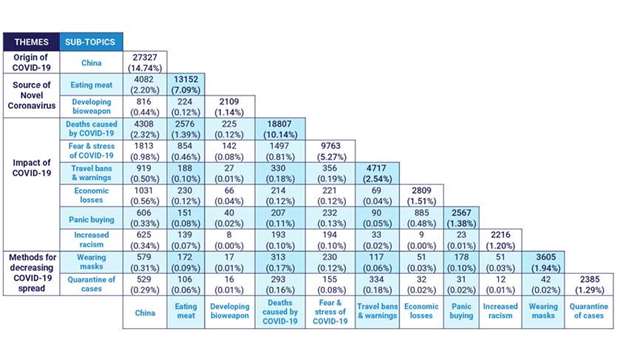The global coronavirus pandemic has left the world in a state of flux. While governments all over the world are moving fast to allay people’s fears, the rate at which misinformation relating to the virus is spreading online is adding further to a sense of panic. Scientists at Hamad Bin Khalifa University’s College of Science and Engineering (CSE) have acted swiftly in carrying out studies across social media platforms to determine the most prevalent fears among the global population.
The results of their initial study revealed that the most common reoccurring fear is the supply of essential goods and food items being depleted. This has already sparked reported panic buying of goods such as toilet paper and non-perishable food items in several countries.
“The first part of our study entailed analysing over 1mn tweets from around the world to investigate the global population’s main fears and concerns. Our preliminary results show that people’s top concerns relate to the economy, being quarantined, and running out of food supplies,” explains Dr Mounir Hamdi, founding dean of CSE.
Through the study, the CSE team hopes to gain a better understanding of the trends being shared on social media from an individual and public policy perspective.
“Such research can help direct the messaging of policymakers to ensure the effective management of the outbreak,” explains Dr Zubair Shah, assistant professor at CSE, who heads the research team comprising Dr Mowafa Househ, associate professor at CSE, Dr Alaa Abd-Alrazaq, a post-doctorate researcher at CSE, and Dr Dari Alhuwail from Kuwait University.
“In our analysis, we separated individual concerns from country-level concerns. For example, individual concerns were related to general fear and stress, death, panic buying, and racism. From a country perspective, concerns relate to the rising number of deaths, travel restrictions, and the economy,” says Dr Shah. “In assessing tweets from across the Arab world, we also aim to draw comparisons with other parts of the world to understand and identify common fears and concerns,” Dr Shah adds.
Until recently, surveys, registries, and information from health departments were the common means for public health surveillance. However, this has started to change with surveillance systems now being designed to use large-scale, publicly available, self-reported data sources such as social media, news sources, blogs, opinions, and other information sources.
As CSE’s studies show, there is now enough evidence that the results produced by monitoring such sources are at least as good as results produced by using surveys, registries, and health departments reports. Modern surveillance systems now powered by Artificial Intelligence and big data analytics using these sources extract important signals that are indicators of population-level health outcomes. These systems cost less, are much faster, and much broader than what can be obtained from traditional surveillance systems, which can be resource-intensive and relatively slow to report.
Through the research, the team also found that many of the discussions online were based on the topic of prevention methods. Results indicated that people are asking and sharing information relating to masks, quarantine, and travel ban advisories, which indicates that there is insufficient accurate information about how to safeguard against contracting the virus.
Following on from the initial study, the CSE team will focus on key themes identified in their preliminary results and do a follow-up study on specific behaviours. The second study will assess disinformation (deliberate) versus misinformation (unintentional) to understand how the messages are spreading and through which channels – Facebook or Twitter – and whether by text or image.
“Our study will assess information velocity – how fast information is spreading on social media platforms, and which information is travelling faster – disinformation, misinformation or credible information. During the current coronavirus outbreak, our preliminary results show that disinformation and misinformation travel faster than information from legitimate and credible sources, which is cause for concern in a time of crisis,” explains Dr Househ.
The research being carried out at CSE will assist in developing policy that is able to counter misinformation in the Arab region and across the globe.
“We anticipate that governments will make use of the findings to adapt their messaging to relieve the anxieties of people and counter misinformation and disinformation about the virus,” says Dr Househ.



